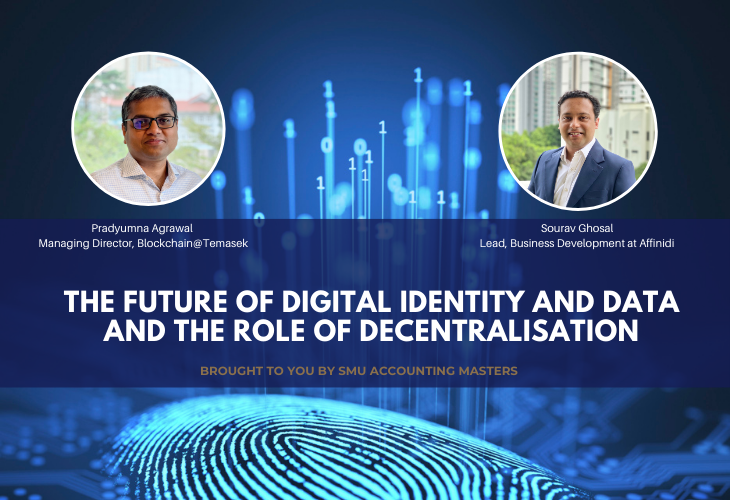Enabling seamless experiences with decentralised technologies
With the advent of Web 3.0 and the interoperability of digital information set to be the next step in the digital transformation that is underway, ensuring portability, security, privacy, and authenticity of data for customers could allow companies to take their business to a higher level. Delving into the changing world of technology and the solutions available to enable the transition towards interoperability of data were Pradyumna Agrawal, Managing Director at Blockchain@Temasek, and Sourav Ghosal, Lead, Business Development at Affinidi, who shared their experiences in a recent Masterclass titled The future of digital identity and data and the role of decentralisation.
At the core of these developments is the rise in the adoption of a digital identity, which Agrawal defined as a form of “digital footprint” that users leave across the Internet – through websites, entries, and databases. However, existing systems remain siloed and largely uncontrolled by the user, he continued. “A very simple example of siloed identities today would be if you’re watching movies on Netflix and switched to Amazon Prime – the two applications will not be communicating with each other. Therefore, your identity becomes increasingly siloed, is not portable, and this, fundamentally, is because you don't control your digital identity today,” Agrawal explained.
What the future holds, he continued, is portability. “In the future, which is basically a world in which you are represented in some digital form, your data is free to move across different platforms, so you can seamlessly go from one platform to the other,” he remarked. As this world of digital identities and the related possibilities for businesses and customers starts to unfurl, security becomes paramount, considering that the technology enabling this change is the very same that could be used for data breaches and identity fraud.
According to Javelin Strategy & Research’s 2021 Identity Fraud Study, identity fraud scams cost US$43 billion out of the total combined fraud loss of $56 billion in 2020, largely driven by the pandemic that saw customers relying more on digital platforms for work and personal life. Similarly, the banking sector was hard hit by the increase in fraud activity, as criminals leveraged new vulnerabilities amid the pandemic, with 30-40% of identity fraud victims either unable to satisfactorily resolve their problems with their financial service providers or closing their accounts due to a lack of resolution.
This is where blockchain decentralisation can help in improving security, Agrawal shared. “What you don’t want is one central database, which can then become the subject of malicious attacks and data breaches… There is a federated or decentralised structure, which allows you to manage the risks of breaches. However, even in most decentralised structures in use today, the management of critical private keys remains centralised. A lot of the hacks that have happened are due to people storing the private keys in some centralised infrastructure that someone else gains access to in some way leading to a broader hack,” he continued.
Agrawal also pointed out privacy is a key consideration for digital identity. However, customers’ practical attitudes towards privacy versus what they claim to be their concerns are quite different, all while platforms are treating the data as their own. “Customers prioritise convenience at times without realising privacy implications. Technology can now facilitate selective sharing which can help all of us maintain the privacy of our data and identity while enjoying the benefits of most applications,” he highlighted.
Last, but not least, is authenticity, which Agrawal explained is critical, especially in a digital environment. The banking industry is a good example. Customers are required to download and share bank statements to apply for loans with third parties. Third-party lenders have to rely on anti-fraud solutions and are unable to digitally verify whether the information shared with them is authentic and actually coming from the customers’ bank.
With customers regaining control of their own data, Ghosal pointed out that companies and businesses are shifting the focus back to generating value through providing superior service, instead of using the platform, which then captures value. “The majority of the value should be generated by the business or service provider and the person who created that service. The platform is just there to facilitate the transaction. If anything, Web 3.0 forces the business or service provider to recognise that it does not own the customer, and hence, must provide superior value and service to ensure customer loyalty,” Ghosal said.
Agrawal added that most vertically integrated platforms tend to create closed ecosystems and while they will keep growing and increasing in value for investors, it does not necessarily provide a seamless experience to customers, and in many cases even corporate entities and SMEs. “No one owns the customer, and no one should own the customer. As a customer, I should be getting a good experience across different platforms, so the reason for the shift towards portable digital identity and the resulting business focus is that people are very happy being loyal but they don't want to be locked in,” Agrawal said.
And with Web 3.0 enabling this change to seamless digital experiences, businesses and companies can take advantage of data that is verifiable, portable, and fully secure to serve customers faster, which can even perhaps lower the cost of products or services, Ghosal added.
From a financial point of view, this move to decentralisation could change the way businesses create their business models and processes, as well as connect with customers. “A big part of accounting is about laying down principles and actually ensuring adherence to those principles. Where we think this becomes quite relevant is either in a different context of enterprise blockchain, where there are enough parties willing to get onto a common network and share information. It will make the whole audit process more effective,” stated Agrawal. Effective, portable, and seemingly more secure than existing ecosystems, decentralisation and the technology behind it could hold unlimited potential for businesses and companies going forward.
“At best, technology is an enabler, so technology will remove some aspects of complexity, but the human element will always be there. If anything, technology will improve and help the process,” Ghosal concluded.





